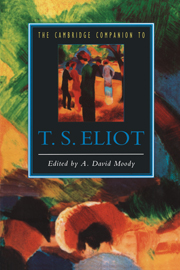Book contents
- Frontmatter
- 1 Where is the real T. S. Eliot? or, The Life of the Poet
- 2 Eliot as a product of America
- 3 Eliot as philosopher
- 4 T. S. Eliot's critical program
- 5 The social critic and his discontents
- 6 Religion, literature, and society in the work of T. S. Eliot
- 7 “England and nowhere”
- 8 Early poems
- 9 Improper desire
- 10 Ash-Wednesday
- 11 Four Quartets
- 12 Pereira and after
- 13 “Mature poets steal”
- 14 Eliot's impact on twentieth-century Anglo-American poetry
- 15 Tradition and T. S. Eliot
- 16 Eliot
- 17 Eliot studies
- A Select Booklist
- Index
15 - Tradition and T. S. Eliot
Published online by Cambridge University Press: 28 May 2006
- Frontmatter
- 1 Where is the real T. S. Eliot? or, The Life of the Poet
- 2 Eliot as a product of America
- 3 Eliot as philosopher
- 4 T. S. Eliot's critical program
- 5 The social critic and his discontents
- 6 Religion, literature, and society in the work of T. S. Eliot
- 7 “England and nowhere”
- 8 Early poems
- 9 Improper desire
- 10 Ash-Wednesday
- 11 Four Quartets
- 12 Pereira and after
- 13 “Mature poets steal”
- 14 Eliot's impact on twentieth-century Anglo-American poetry
- 15 Tradition and T. S. Eliot
- 16 Eliot
- 17 Eliot studies
- A Select Booklist
- Index
Summary
We have become used to all sorts of temporal paradoxes which can be found thriving not only in Pynchon's rockets whose screaming one hears after an apocalyptic Fall, but also in domains ranging from contemporary physics to Biblical theology as revised by new textual exegesis. This would define the plight of the “post-modern” sensibility as a cruel or playful awareness of our being aftercomers, inheritors of a culture others have shaped, and so of living as much in the past as in the present. As Eliot puts it: “It seems, as one becomes older,/ That the past has another pattern, and ceases to be a mere sequence” (DS, v). However, this insight is not one he gained upon reaching mellow maturity, since it can be shown to have been the founding stone which helped him build his poetics. For it was as a “young man” that Eliot boldly put forward the idea that if one views European literature as a simultaneous whole, the first logical consequence is that the past is altered by the creation of novelty: “Whoever has approved this idea of order, of the form of European, of English literature will not find it preposterous that the past should be altered by the present as much as the present is directed by the past” (SE [1951], p. 15).
- Type
- Chapter
- Information
- The Cambridge Companion to T. S. Eliot , pp. 210 - 222Publisher: Cambridge University PressPrint publication year: 1994
- 4
- Cited by

